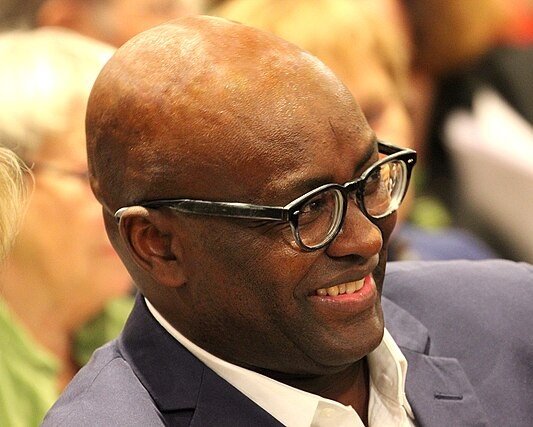Achille Mbembe
 This week, we celebrate the Cameroonian historian and political theorist Achille Mbembe, who will be awarded the 2025 Spinozalens in The Hague on 24 November. Mbembe born in Otélé, Cameroon (1957), is well known for his writings on African history and politics, postcolonial studies and social science. Although he is called a postcolonial theorist, namely due to the title of his first English book, he has thoroughly rejected this label.
This week, we celebrate the Cameroonian historian and political theorist Achille Mbembe, who will be awarded the 2025 Spinozalens in The Hague on 24 November. Mbembe born in Otélé, Cameroon (1957), is well known for his writings on African history and politics, postcolonial studies and social science. Although he is called a postcolonial theorist, namely due to the title of his first English book, he has thoroughly rejected this label.
In his seminal work On the Postcolony, Mbembe argues that academic and popular discourse on Africa gets caught within various cliches tied to Western fantasies and fears. Following Frantz Fanon and Sigmund Freud, Mbembe holds that this depiction is not a reflection of an authentic Africa but an unconscious projection tied to guilt, disavowal, and the compulsion to repeat. Mbembe interprets Africa not as a defined, isolated place but as a fraught relationship between itself and the rest of the world.
Mbembe is currently a member of the staff at the Wits Institute for Social and Economic Research (WISER) at the University of the Witwatersrand in Johannesburg, South Africa, and has an annual visiting appointment at the Franklin Humanities Institute at Duke University.
(Source: Wikipedia accessed on 5 November 2025)
Selected publications
Mbembe, Achille, Brutalisme (Paris, 2020).
Mbembe, Achille, Critique de la raison nègre (Paris, 2013).
Mbembe, Achille, Notes sur le pouvoir du faux (Paris, 2002).
Mbembe, Achille, On the postcolony (Berkeley, 2001).
Mbembe, Achille, Out of the dark night: essays on decolonization (New York, 2021).
Mbembe, Achille, Politiques de l’inimitié (Paris, 2016).
Mbembe, Achille, Sortir de la grande nuit: essai sur l’Afrique décolonisée (Paris, 2010).

